
Jean-Baptiste Sylvère Gay, 1st Viscount of Martignac was a moderate royalist French statesman during the Bourbon Restoration 1814–30 under King Charles X.

Emmanuel-Joseph Sieyès, usually known as the Abbé Sieyès, was a French Roman Catholic Abbé, clergyman, and political writer who was a chief political theorist of the French Revolution (1789–1799); he also held offices in the governments of the French Consulate (1799–1804) and the First French Empire (1804–1815). His pamphlet What Is the Third Estate? (1789) became the political manifesto of the Revolution, which facilitated transforming the Estates-General into the National Assembly, in June 1789. He was offered and refused an office in the French Directory (1795–1799). After becoming a director in 1799, Sieyès was among the instigators of the Coup of 18 Brumaire, which installed Napoleon Bonaparte to power. Moreover, apart from his political life, Sieyès coined the term "sociologie", and contributed to the nascent social sciences.
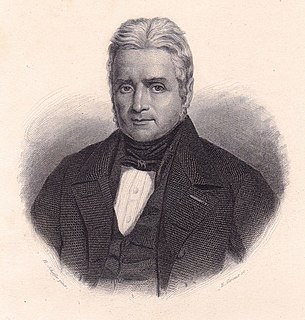
Jacques Laffitte was a leading French banker, governor of the Bank of France (1814–1820) and liberal member of the Chamber of Deputies during the Bourbon Restoration and July Monarchy. He was an important figure in the development of new banking techniques during the early stages of industrialization in France. In politics, he played a decisive role during the Revolution of 1830 that brought Louis-Philippe, the duc d'Orléans, to the throne, replacing the unpopular Bourbon king Charles X. Laffitte was named president of the new Citizen King's Council of Ministers and Minister of Finances. After a brief ministry of 131 days, his "Party of Movement" gave way before the "Party of Order" led by the banker Casimir-Pierre Perier. Laffitte left office discredited politically and financially ruined. He rebounded financially in 1836 with his creation of the Caisse Générale du Commerce et de l'Industrie, a forerunner of French investment banks of the second half of the 19th century such as the Crédit Mobilier (1852). The Caisse Générale did not survive the financial crisis caused by the Revolution of 1848.
The Ultra-royalists were a French political faction from 1815 to 1830 under the Bourbon Restoration. An Ultra was usually a member of the nobility of high society who strongly supported Roman Catholicism as the state and only legal religion of France, the Bourbon monarchy, traditional hierarchy between classes and census suffrage against popular will and the interests of the bourgeoisie and their liberal and democratic tendencies.

Marthe Camille Bachasson, 3rd Count of Montalivet was a French statesman and a Peer of France.

Huningue is a commune in the Haut-Rhin department of Alsace in north-eastern France. Huningue is a northern suburb of the Swiss city of Basel. It also borders Germany. In 2008 it had a population of 6503 people. The main square of the town is the Place Abbatucci, named after the Corsican-born French general Jean Charles Abbatucci who unsuccessfully defended it in 1796 against the Austrians and died here. Huningue is noted for its pisciculture and is a major producer of fish eggs.
La Loge des Neuf Sœurs, established in Paris in 1776, was a prominent French Masonic Lodge of the Grand Orient de France that was influential in organising French support for the American Revolution. A "Société des Neuf Sœurs," a charitable society that surveyed academic curricula, had been active at the Académie Royale des Sciences since 1769. Its name referred to the nine Muses, the daughters of Mnemosyne/Memory, patrons of the arts and sciences since antiquity, and long significant in French cultural circles. The Lodge of similar name and purpose was opened in 1776, by Jérôme de Lalande. From the start of the French Revolution in 1789 until 1792, Les Neuf Sœurs became a "Société Nationale".
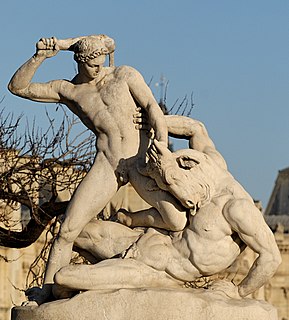
Étienne-Jules Ramey, called Ramey fils, was a French sculptor.
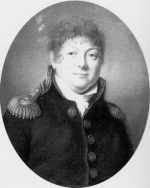
Jean Augustin Ernouf was a French general and colonial administrator of the Revolutionary and Napoleonic wars. He demonstrated moderate abilities as a combat commander; his real strength lay in his organizational and logistical talents. He held several posts as chief-of-staff and in military administration.
Jean-Honoré Salavy (1749–1823) was a French businessman and politician.
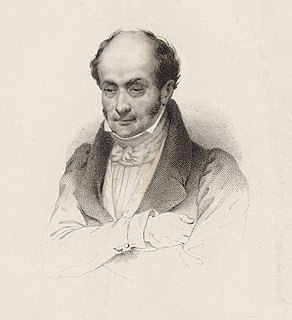
Jean Claude Balthazar Victor de Chantelauze was a French lawyer and politician who was appointed Minister of Justice in the last weeks of the Bourbon Restoration. He lost his post in the July Revolution of 1830, and spent the next six years in prison.

Antoine Roy was a French lawyer and politician. He was a National Representative during the Hundred Days when Napoleon returned from Elba, a Deputy from 1815 to 1821, a peer of France and three times Minister of Finance.
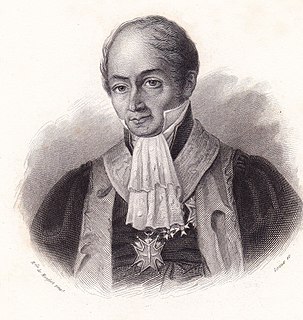
Pierre François Hercule de Serre was a French soldier, lawyer and politician. He was a deputy from 1815 to 1824, and was Minister of Justice in three successive cabinets from 1818 to 1821. He sat on the center-right, but had liberal views on press freedom, direct elections and the use of juries.

Pierre Laurent Barthélemy François Charles de Saint-Cricq was a French customs administrator and politician. He was a deputy from 1815–20 and 1824–33, Minister of Commerce & Manufacturing (1828–29) and a peer of France.
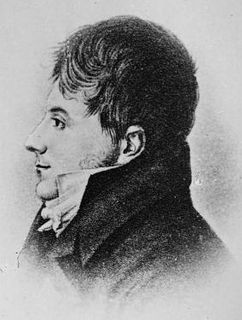
Jules Jean Baptiste Anglès was a French politician who was Minister of Police for a short period in 1814.

Count Georgi Arsenyevich Emmanuel was a Russian general of the Napoleonic Wars of Serbian origin.
Louis Charles Achille d'Artois de Bournonville was a French writer, libretist and dramatist.
Philippe Veranneman de Watervliet was a politician in the Southern Netherlands. During the period of the United Netherlands he was a member of the Second Chamber in the States General. He was also, between 1828 and 1830, the last mayor of Bruges before 1830, when the southern part of the country broke away to form the separate state of Belgium.

Antoine Simon Durrieu was a French General and politician. He was born on 20 July 1775 in Grenade-sur-l'Adour (Landes) and died on 7 April 1862 in Saint-Sever (Landes).














